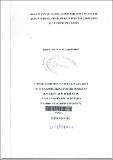| dc.description.abstract | The study was undertaken in Nandi County and it was to establish the role played by Diguna homes for orphans and the integration of these orphans into the community. The objectives of this study were to assess AIC Diguna home perception on orphans Christian teaching, examining the role played by Diguna children’s homes in dealing with orphan children, investigate challenges faced by orphaned children while in Diguna children’s home and thereafter suggesting effective ways of integrating orphaned children into the community. The study employed qualitative survey and use simple random sampling as an attempt to come up with good representation of orphans. The sample size targeted seventy respondents to be drawn from orphans, elders, foster, parents, Diguna leaders and teachers. The study utilized a number of data collection tools as interviews and questionnaires. The data collected was analyzed using both qualitative and quantitative techniques. Qualitative data was translated; presented and analyzed using descriptive statistics in order to determine frequencies, percentages and pie charts with the help of SPSS as a tool. These frequencies and percentages used tables and figures. While quantitative data was grouped into similar categories for analysis. Basing on the study findings, members of Diguna community were generally born again and thus are able instill children Christian virtues to the orphaned children thus improving their chances of a smooth integration. To avert the attempts to escape, children should be treated fairly, visited regularly and given freedom to express themselves while in the children’s home. It was observed that children who lack community support, lack basic needs in the society and feel that home conditions are better than that in their community are likely to go back to the children’s home. Regarding ways of ensuring that the children cope well, there must be concerted efforts by both the children’s home and the community to ensure here is no gap in the treatment of the orphaned children. | en_US |

